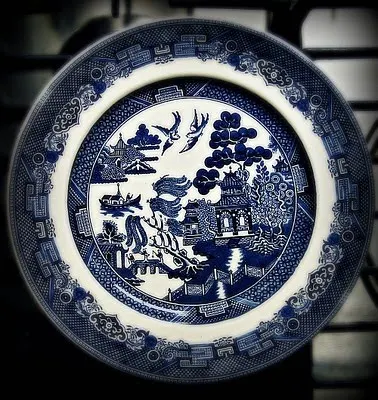 I usually write a story based on the prompt but this week I did some research on the photo. When I learned the legend behind the plate, I thought for awhile about what I could write. I finally decided the legend was better than anything my imagination could come up with. So . . here it is:
I usually write a story based on the prompt but this week I did some research on the photo. When I learned the legend behind the plate, I thought for awhile about what I could write. I finally decided the legend was better than anything my imagination could come up with. So . . here it is:
Long ago in China lived a Mandarin and his daughter, Koong-shee. Koong-shee fell in love with a commoner, a man named Chang, and their love grew as they met beneath a willow tree in the palace garden. When the Mandarin discovered their secret, he banished Chang and imprisoned Koong-shee by encircling the palace with a zigzag fence.
Soon the Mandarin promised Koong-shee to another, and the marriage date was set. A great feast was held to celebrate, but afterward, when everyone had fallen asleep, Chang crept into the palace and fled with Koong-shee.
The Mandarin awoke and pursued the couple across a little bridge that spans the river. The lovers escaped, but soon the Mandarin discovered where they were hiding and sent his men to kill the couple. The men came upon Chang as he was working his fields and killed him. Koong-shee, who witnessed the entire scene from afar, rushed into the pavilion and set it afire. She was determined to be with Chang in death as she had been in life.
The gods, looking down on the tragedy, took pity on the lovers and transformed their souls into a pair of immortal lovebirds to forever live in the pagoda.
We can still see Chang and Koong-shee flying over the willow tree where they first pledged their love. Their story lives forever on the Blue Willow pattern.
 With apologies for my plagiarization, I gathered the legend from The Blue Willow Restaurant in Tucson, Arizona
With apologies for my plagiarization, I gathered the legend from The Blue Willow Restaurant in Tucson, Arizona
Breakfast at the Blue Willow will never be the same. Thanks for background on one of my favorite places for french toast.
ReplyDeletea/b
I've always loved the story behind the pattern. I remember reading a book in second grade about it, and actually found an identical copy on eBay a few years ago. Love your telling of the tale, Mr. C.
ReplyDeletewhat a story.!!! i was unaware of this tale.. thanks for sharing :)
ReplyDeleteI'm so glad we have legends to tell. Imagine if we humans had to live without the signs and symbols of folklore. We wouldn't know what a rainbow meant. We'd have no clue what Dante was getting at. Actually, I guess Dante would have had to write a different sort of poem entirely. We'd have no fairy tales, no Bible, no "Creation" on the ceiling of the Sistene Chapel. We wouldn't have a memorable past at all.
ReplyDeleteI enjoyed your retelling of the story. I have always loved this story, and the Willow Pattern china, and I have a wonderful old sugar bowl, which was treasured by my English Grandmother.
ReplyDeleteDear Catalyst: Truly amazing! Is this tale true? Or just legend? Or both? Have you ever played that theatre arts game where you tell a story and that person tells it to the next person and so on and so on uttil the end of the line? I think it is called Telephone Line? By the end of the row of a few people the story has changed dramatically to the point where it is totally unrecognizable in it's original format. Maybe this story is written somewhere else in China, in a poem or an historical account by The Ming Dynasty or whatever dynasty where this pattern arose. Guess will have to go to China to find out! Great Wall here we come! The Blue Willow Tour Guided Tours by Willow! Catayst will be the researcher! Along with the fortune cookie the Blue Willow Pattern story blurb on the Blue Willow Restaurant paper placemats make great conversation. What a great take! Thanks!
ReplyDeleteAnd I thought it was just a nice plate. Thanks Cat, its a lovely story in that great magical tradition of myth and legend. I might just have a plate of my own for a story. You've helped me get a sniff of what i might write.
ReplyDeleteJane - It is a legend. Just a not so pretty fiction.
ReplyDeleteI love this story and everything it means .... thanks for sharing.
ReplyDeleteI had never heard the story. I love it! Thanks for sharing it with us.
ReplyDeleteyou're right, the truth is even more beautiful than a work of fiction :) thanks for taking the time to look into the plates origins, it was so worth the read today, such a good magpie, catalyst!
ReplyDeleteHeck, I enjoyed this!
ReplyDeleteand I have lots of that pattern
on my table
oh that is fascinating..someone just asked if i knew the story behind the plate on my magpie...think i will send them your way...
ReplyDeleteThe fact that these plates are still valued just for the design says a lot in todays 'quick fix' world. And because they do the story lives on, thank you for writing it out.
ReplyDeleteChristine
Star-crossed Lovers a la China! Love the story, albeit bittersweet. Thank you for sharing. :)
ReplyDeleteIndeed, it is a beautiful legend that lives on and on. Good post!
ReplyDeleteInteresting Catalyst thanks for the legend - I enjoyed reading it-- I read a different version somewhere and come up with a poem Loved this original one.
ReplyDeleteJoanny
Thanks for taking the time to do the research, and letting us all in on the legend
ReplyDeleteThanks for sharing that : I knew there was a legend somewhere but was unsure as to what it exactly was.
ReplyDeleteI had never heard the legend, though I knew there was one (not least from others' Magpies!) but I'm glad you shared it. And never fear...your imagination will come up with something ;)
ReplyDeleteYou tell this tale as if you were there..so well done! Glad to finally have the facts...thank you.
ReplyDeletewhat a thoughtful magpie,
ReplyDeleteI am glad that you did research on it.
I did not do research, but wrote one sad love story as well.
Happy Monday!
Wonderful telling of the story!
ReplyDeleteI loved reading this! Great story behind the design. I think I read your rendition of the story and then checked wiki also. I based my poem for the prompt more on the legend as well, instead of the actual plate. I like the way you re-told the story.
ReplyDelete